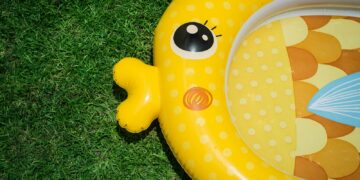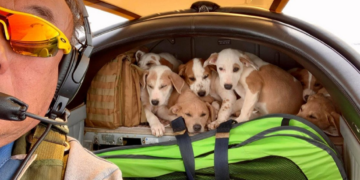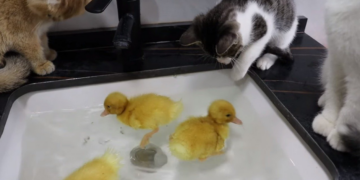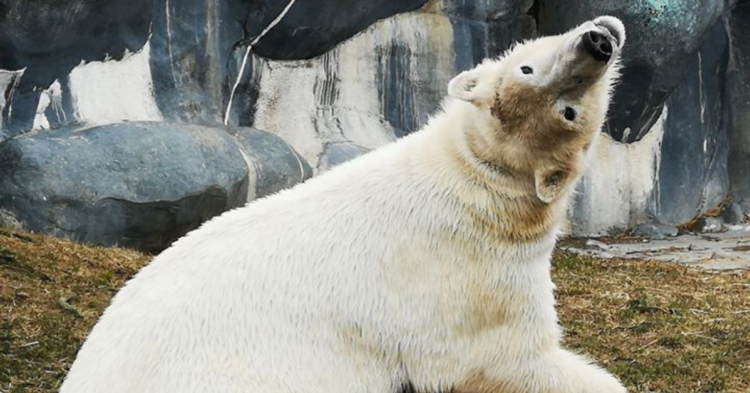Since the COVID-19 pandemic forced the shutdown of any large public place, we’ve seen how wild animals have been affected by the lack of humans, now entering spaces where they would previously have felt unsafe.
But what about animals in captivity? How would the sudden lack of human interaction affect them? One person decided to turn to the zookeepers of Reddit to ask if they could shed some light on the situation. Turns out, the lack of humans hasn’t always been as welcome as you might expect. For some animals, it’s a blessing, but others seem to be having some difficulties.
“I’m on day 25 of working at a closed zoo. I work with great apes, and their behavior has changed a bit.”
“They are generally very interactive with the public, so they are seeking even more attention than usual from us,” wrote Erosenthal .
“Some of them were suspicious at first of the overwhelming silence outside now. They were climbing up high and scanning the area looking for everyone.
” Edit I forgot to mention the wild animals. We are in a much larger park, and wild animals wander in all the time, but always scatter when the crowds roll in. Now, there’s bucks just walking around, raccoons and foxes out in the middle of the day. And the squirrels… my god, the squirrels.”
“Most of our animals are happy as long as we can keep their routines, feeding times etc.”

“For some they need a little extra. We do public encounters with our koalas, wombats and snakes among others so we spend an hour or so a day cuddling and handling these animals to keep them happy,” wrote sdooj , who identified themselves as living on Australia’s Kangaroo Island.
“A few of our koalas really fret if they don’t get their cuddles. Otherwise we just try to continue to spend time with animals that are expecting human interaction and of course we can take things for walks around the place like I’m sure you’ve seen at other zoos. Our wombats love a run and sniff, dingoes as well.”
“In our local zoo the apes started to miss the visitors so they brought in an artist in [sic] who’s now just painting in the empty monkey house so the apes have someone to watch.”

” […] they could tell they missed the visitors because they became very bored and are much more excited about the keepers than usual; apparently they watch the visitors as much as the other way around,” wrote thegoldensnitch9 . “The keepers now have to pay them more attention to [sic] and they also do stuff like hide food for them as a game.”
“Due to temporary staff cuts, they no longer have the people to regularly walk the wombats.”

“Some of the wombats are holding the keepers personally responsible,” wrote CursedUmbrella . “Imagine having a 20kg chunk of muscle with big rodent teeth mad at you.”
“I’m an aquarium keeper, and I’ve certainly noticed a change.”
“Fish are not as stressed as they use to be, as there are no longer children stomping around and banging on glass screaming “NEMO, NEMO, ITS NEMO” at every clownfish,” wrote Qicklash . “We brought some of our younger penguins down to let them watch the fish, and they were intrigued but confused as to why they couldn’t catch them through the glass. Our octopus has become much more friendly as well, and instead of hiding all day from people, enjoys playing with small baby toys or solving food puzzles. Its been nice. I wish there were guidelines people had to sign to behave at zoos before entering, but at the same time, they are the lifeline we so desperately need to keep functioning.”
“I work with the ambassador animals, so they are animals that are very used to the public.”

“Pretty much like what everyone else has said, the animals are mostly confused that there aren’t any people,” wrote zooolady . “Our petting zoo animals in particular are super needy. The second they see or hear us they all come running over and start crying for attention. We’re trying to give all the animals as much attention as possible, but we’re down to a bare bones crew, so it’s not as much as we would like.
“What I wanted to add, though, because I think it’s incredibly interesting, is that we are collecting fecal samples from some of the animals to be tested for cortisol levels, which is a pretty good indicator of stress levels. That way, when guests come back, we can take samples for comparison to see how much guests impact stress.
“I think its [sic] really cool that we’re taking this opportunity to see what we can learn about how guests impact the animals, and to see if there are potentially things we can do even better to improve the lives of the animals in our care.”
“My girlfriend is a zookeeper and animal behaviorist. She says their animals are becoming stressed.”

“One of their African Grey birds has been plucking his own feathers,” wrote BanditRecon .
“She also mentioned that because they can’t touch many of the animals due to the virus potentially spreading to another zookeeper, many of the animals are looking and acting depressive, not eating well, etc.”
“Horse trainer/Barn manager here. My farm has 46 horses, about half are privately owned and boarded with us.”

“Like most farms across the country we are completely shut down to all but essential staff,” wrote another Reddit user. “The horses are mostly pretty happy to eat, hang out, and do horse things. We keep our horses turned out 24/7, which helps them remain healthy, happy, moving, and socializing. They are starting to lose muscling at this point, with being worked/ridden. Months or years of conditioning just disappearing by the day. But it will come back once they are all in work again. But I can tell that they are missing human interaction. My personal riding horse was giving me the cold shoulder yesterday, probably because of the lack of attention. I have been trying to give the boarded horses extra attention, I am sure their owners are missing them terribly right now. They all seem to lean in a little more when I brush them these days.”
“Not a whole lot of change, but animals definitely missing out some enrichment of seeing guests, especially the otters that follow the kids in the glass under water.”

“Takin, Maned wolves, bison, gibbons, BoPs, Lions, etc all are about the same,” wrote FriedCockatoo . “Some of our animals that are skittish have been standing closer to the fence where guests usually are (zebras, gazelle) which is nice.
“It’s kinda this weird balance of being both more and less stressed. On the one side, I don’t have to worry about keeper talks or BTS tours and I have more time to get everything done and spend more time with animals. On the other side we’re skeleton crewed and there’s less of us to care for the whole zoo so I’m working a lot more in areas I don’t usually cover as often.
“There’s one kangaroo that still tries to box me while the emu is shifting. The one peacock still really doesn’t like taking his medications of course.”
“For a lot of our animals, having the ability to interact with guests is actually extremely important.”
“Even for primates to be able to play with kids through the glass, they are missing out on a lot of enrichment,” wrote Frogchix08 . “Guests keep a lot of the monkeys entertained. I watch our guests all day long show our marmosets and capuchins selfie cameras and they LOVE to see their reflection. Guests will also show videos on their phones to animals and the monkeys totally enjoy it.
“We have a rescue cockatoo named Row who sings “row row row your boat” to guests. When little kids dance and sing it to her, she gets really excited and feeds off their energy. So do our other cockatoos on exhibit. But now without guests to show off for, every now and then when it’s quiet we’ll hear her start “row row row…” and then she stop and huffs a bit and gets really quiet and sad because she has no one to sing to. Some of our animals REALLY miss having kids to show off for.
“You also have to remember that animals in zoos for the most park [sic] have grown up totally accustomed to being around people 24/7. They’re not wild animals at all really. They’ve grown up in a very different social dynamic. Quite a few animals get noticeably depressed in the winter months every year when we have few guests, and then perk up in the spring when we get busy.”
“One of our emus loves everyone and makes friends with any new keepers who visit him, and so by extension loves having guests around.”
“With the zoo being closed, he became quite morose for a few days, not acting anything like his usually happy self, because all the new friends he makes everyday were gone,” wrote DefinitelySteveIrwin . “So his keepers began asking people from other departments to stop by, take pictures, point him out, basically act like he’s the center of attention. The hilarious little diva has been loving it.”
“I work with a lot of geriatric animals at the zoo so it’s not surprising that they have become a lot more relaxed since we closed to the public.”

“Ex. Our artic fox spends a lot more of his time basking in the sun instead of spending time in his back holding area trying to avoid screaming children,” wrote OhThoseCabbages .
“Control your children at the zoo please…”
“I work at a very well known and heavily visited zoo…”
“I work with ambassador animals and it’s nice to get a chance to take animals to areas of the zoo they wouldn’t normally get a chance to go to because of traffic etc,” wrote antelopeunfolded . “BUT, the free ranging geese man…. they are getting mean and territorial. Literal bridge trolls. They might have the hardest time adjusting when all the people come back and they can’t control every pathway!”
“There’s a bit of a balance of different behaviours that is kinda interesting.”

“With no visitors there is more time for enrichment, to get more creative with said enrichment, trialing new things, and exposure to enrichment that has to be supervised which the animals are loving,” wrote Avynn . “Then there are certain animals that do seem to miss having public around – our younger (<5 years old) African Penguins are really seeming to miss being able to swim at the glass and interact with people. Higher intelligence animals we have had to come up with new interactions, lots of new training going on because they are 'missing' the variety and variability of interactions with the public.
“The snakes don’t give a f*** though.”
“I work at one of the most popular zoos in the UK, and because of that one of the largest.”

“I’m working from [home] right now so I can’t comment first hand but my Co-workers are saying how curious the animals are,” wrote JukeLoseph . “Every person that walk [sic] by they’re very interested in.
“On a side note, I always assumed an empty zoo would be a much better place for the animals and would be much more enjoyable for the keepers. However, when I asked a keeper friend of mine she said she feels like she’s lost part of her purpose without visitors.”
“My wife works at the gift shop for our zoo and the other day we had to go move some stuff around in the store because due to some heavy rains, it had flooded a bit.”

“Of course we took a lap around the empty park (other than the keepers and few maintenance workers) and found that all the animals were really active and playful,” wrote Grandpas_Cheesebarn . “A lot of them seemed really curious about us too. I’m sure they get used to seeing crowds every day and were starving for attention.”
“Our city zoo is closed for visitors. However all the routine feeding activities are in place.”

“Looks like some animals found it weird that there are no people around,” wrote ttcube . The other day a fully grown white tiger started jumping like a puppy when he saw a few of us after two weeks of solitude.. that was a scene!”
“Most of our animals are more relaxed then [sic] they are with big crowds, or are acting mostly like they usually do.”

“We have 2 bears that like to people watch, so they’re definitely missing that source of entertainment, but are otherwise pretty normal,” wrote aurora4847 . “The biggest difference is that our pair of bald eagles mated for the first time in the decade that they’ve been housed together. We don’t intentionally breed our animals, so there isn’t a good nesting spot in their enclosure but they just scraped out a divot and laid 2 eggs in it! However, neither are incubating the eggs, and we don’t have breeding permits for them so we can’t keep the eggs 🙁 Very unpopular with our visitors. The geese that nest on the property are also getting extra territorial and threatening us keepers a lot more.”
“Most are fine. We are trying to make the days as normal as possible.”

“Shifting and cleaning at more or less the same times. Taking more time with animals that are used to a lot of public interaction. Helping hand feed the petting zoo animals. Taking out the education animals,” wrote karakins21 .
“I’m actually surprised how well the primates are doing, more so because they are used to the attention from the other staff that are no longer here.
“The only reaction I’ve seen: myself and several keepers and maintenance crew were standing outside one if [sic] the cat enclosures and when she came out she looked startled that there was a group of people there.”
“A lot of the animals have noticed! We compare it to having 300 channels of cable tv to suddenly 10 channels.”

“The apes, cats, and birds probably notice the most and get excited when any of us walk by,” wrote How_you_like_meow . “We actually have our firm instructions to take a regular walk around our big cat area because one of the snow leopards is sad from the lack of people calling him handsome daily.”
“As a zookeeper coordinator I’ve been working at the now closed zoo almost every day for the past month.”
“Animals that are free roaming (peacocks, iguanas) are more active, and follow keepers around like they usually do with visitors,” wrote Pyrocephalus-rubinus. Most of the others don’t show much change in behavior. Although birds like swans and flamingoes are using the edges of their habitats more.”
“The majority of our display birds could care less, however our birds that do flights outside or routinely meet guests and do more interactive behaviors with the public have definitely noticed and they are not cool with their being no guests around.”

“Of course I can only guess, and while this is a bit anthropomorphic, I don’t think they understand the change and seem somewhat hesitant to enter a new environment (to them) as we try to maintain their behavioral skills,” wrote PizzaLinter . One of the macaws who is also excited to fly is now always looking around. Pretty sure she expects for 50 to 100 people to be watching her.”
“I am a fulltime zookeeper and it’s been difficult since we had to lay off all our seasonal/part time help.”
“More work for those of us still there, but the animals are all still getting top-notch care,” wrote zookeeperNstbernard . “We’ve been able to take them out to new places they don’t get to when guests are around. Like taking our porcupine to the manatee building and walking a cheetah past the rhinos. I think it’s fun for them, but I haven’t seen any animals acting differently.”
“I am a zookeeper that works with strictly ambassador animals that are used to seeing people up close.”

“We’re trying to spend as much time with each one to make sure they’re getting lots of mental stimulation,” wrote aquanite .
“We’ve been bringing a raptor (one at a time) in our office too just to hang out each day.
“So far the animals under my care are all doing perfect. It’s the most I can hope for!
“Now us zookeepers on the other hand….it is tough. No volunteers, staff segregated to minimize exposure…it’s going to be a long road. I’m jealous of the keepers that have the extra time to deep clean and take their animals on leisurely strolls around the zoo. I’m working nonstop for 11 hours a day most days.
“I’m just thankful we are keeping our jobs. I would be lost without my animal coworkers.”
“Depends on the species and even the individual animal.”

“The kangaroos and wallabies who live in our walkthrough enclosure are loving the free roaming throughout the day and not having to stay off the paths, this is making finding them more difficult as they are moving away from there [sic] ‘normal’ rest spots,” wrote jennabenna11 . “This goes for all animals in interactive enclosures actually. Some of the birds are missing the attention. The wild ravens and seagulls are a bit upset about the lack of easy to steal food. The elephants are enjoying being able to come out for walks at anytime during the day as opposed to in the morning before opening.”
“I work with birds at my zoo, and they are actually displaying so many more natural behaviors than they normally do!”
“They are much more comfortable just being birds with less people around,” wrote eweezzyy . “They don’t have to worry about getting spooked, or stepped on, or screamed at. It’s kind of a really cool thing to witness first hand!! I expect we might make more babies than a normal year, so that could be a bit of good news!”
“The majority of our wild animals haven’t been behaving differently. This is probably because their exhibits have visual blockers where they can avoid the public eye if they want.”

“The only exception to this is our eagles who laid an egg for the first time in the 13 years they’ve been here,” wrote RichardBiscuits .
“Our domestic animals, especially the goats, miss you guys. They are used to having members of the public come to feed and interact with them. It is very enriching and while we provide them with toys, puzzle feeders, browse, and other treats we don’t have tons of time to spend one on one with them.”
“Honestly, the animals at my zoo don’t miss the visitors.”
“They do miss the extra attention they would normally get from us though, walking the alpacas, extra training sessions with the capybara etc,” wrote animax_nz . “We are working 2 teams at the moment on minimum staff so we are trying to pack in all our normal tasks into half the time. It’s totally worth it though, those animals are getting the best care, food and entertainment possible.”
“Bird keeper here: the penguins weren’t sure it was really feeding time if no one was watching them… they’re a little bit exhibitionists.”

“(Especially Hubig/Ocio. They’ve been caught going at it in front of the windows during public hours and then basically avoiding each other when we’re closed…) After a few days they adjusted,” wrote kakyflakes .
“However the parrots are demanding alllll the snuggles and attention, but heaven forbid one sees you snuggle someone else even if they JUST had their turn. So the macaws get to go on individual walks and get snuggles elsewhere so my ears don’t start bleeding from the screaming.”
“Our giraffes have gotten a bit suspicious without the guests being around.”

“It seems to be really spooking them. The gorillas are happy though as they don’t really like the guests so they are spending way more time outside which is nice,” wrote DemonInUrCloset .
“Oh and i just remembered that the zoo is running extra announcements over the loud speakers aside from the usual to keep the animals used to the sound of the speakers.”

















































